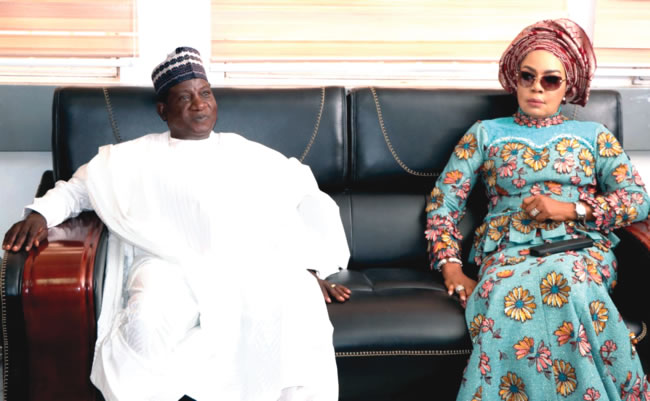Ministers of Labour and Employment, Simon Lalong and Honourable Nkeiruka Onyejeocha, described their appointments as a call to service. They also pledged to work closely with NLC and TUC to resolve all pending industrial relations issues. CHRISTIAN APPOLOS writes on the task ahead of the ministers.
Considering the volatile industrial relations between the Federal Government and the organised labour, Minister of Labour and Employment, Simon Lalong and the Minister of State for Labour and Employment, Honourable Nkeiruka Onyejeocha, are among the ministers of President Bola Tinubu’s administration that will definitely need big tool bags filled with extra energy, solomonic wisdom, genie magic and sincerity, among others, in order to achieve success in their assigned duties.
The task ahead of the two newly inaugurated ministers of Labour and Employment is to change the narrative from apprehending industrial crisis to fostering true industrial peace in the country. It is no brainer that Nigeria experienced the worst period of industrial disharmony during the eight years of former President Muhammadu Buhari. And today, all eyes are on Lalong and Onyejeocha. Would they be able to change the narrative?
Former Minister of Labour and Employment, Senator Chris Ngige, through different mediums, proudly stated that he apprehended over 1,000 industrial action cases. However, in reality, there were quantum of unresolved volcanic-like industrial crisis between the Federal Government and trade unions. Today, they are still erupting deeper into the grounds of industrial relations, gathering momentum and may eventually hit every facet of the country’s economy tremendously if needed steps are not urgently taken.
Against this background, Lalong, in his address on assumption of duties, said, “Government, through the ministry, shall work closely with the NLC, TUC and their affiliates towards not only ensuring that all pending industrial disputes are settled amicably, but also addressing with strong determination the new minimum wage and other palliatives arising from the removal of fuel subsidy.”
In her submission, Onyejeocha said, “There must be change. We must think out of the box.” Another factor that may become their greatest quagmire is the sincerity of government (the presidency) and willingness to implement agreements reached with labour unions going forward.
This is because both the Nigeria Labour Congress (NLC) and the Trade Union Congress of Nigeria (TUC) have constantly posited that government’s insincerity, lackadaisical and nonchalant attitude to implementing agreements freely reached with labour unions are the chief cause of strikes and other industrial disharmony witnessed in the country. Will President Tinubu be willing to make the job of the two labour ministers easier or more difficult?
Interestingly, while the government was busy using different tactics to refuse implementation of agreements reached with different trade unions, splitting some power unions like ASUU, the affiliate unions, on the other hand, got themselves busy forming interest-based coalitions, strategising and fostering collaboration to meet government on the field.
The International Labour Organisation (ILO), through its Country Director for Nigeria, Ghana, Liberia, Sierra Leone and Liaison Office for ECOWAS, Vanessa Phala, has, however, advised that structural approaches are key in the resolution of industrial crisis such as was observed in Nigeria during the former President Buhari administration, where ASUU went on an eight-month strike, closing down all the tertiary education in the country.
ILO harped on the need for the promotion of social dialogue as an instrument of social and economic governance to not only create the confidence necessary for the attractiveness of investment and the productivity, but also to curb the various social crises that have marked and are still marking the working and production relations.
“The main causes of the state of labour relations are quite diverse but can be reduced to: the lack of control over the rules of the game by the actors; the lack of strategy of watch, prevention and anticipation; the lack of mastery of the fundamentals of the national economy and its requirements; the politicisation of the union world; the multiplication of ad hoc bodies and lack of mastery of negotiation techniques and conflict management skills.
“The main way to find solutions is social dialogue. Social consultations and bargaining offer opportunity to social partners and governments to create the conditions of productivity or competitiveness. We must develop and make them more proactive. Prevention will allow us to preserve resources like finances and time. Prevention will help to stabilise industrial relations.” The UN agency, added.
On the other hand, the two labour centres, NLC and TUC, have come out to say that apart from the glaring case of government’s display of insincerity in dealing with industrial relation issues in the area of workers welfare, “anti-poor policies of the Federal Government” is a worrisome factor that may force workers to embark on serious industrial action.
NLC President, Comrade Joe Ajaero, in a message to the Federal Government through the registrar of trade unions at a recent event, said, “I want to plead with the government that those bad economic policies that make our wages next to nothing should be checked. If you check those policies that lead to inflation and devaluation of the currency, we will be comfortable.” Giving a clear example, he said, “Nigerian workers will not give any strike notice if we have not addressed the consequences of the last two increases of fuel pump price and we wake up from asleep to hear that they have tampered with the fuel pump price again.
“If inflation reduces, we will ask you to leave things the way they are. But inflation is flying and by the admittance of the National Bureau of Statistics, we have over 133 million Nigerians that are multidimensionally poor. I think these are the issues the government should address.”
On his part, TUC President, Comrade Festus Osifo, warned, “You cannot ask Nigerians to keep tightening their belts and sacrificing when you are not doing same. The Nigerian masses have been battered, passing through excruciating difficulty but we have not heard that the president of the country has said anything regarding the cost of governance. You cannot tell us to embark on protest or strike, threatening us with court injunctions and still want us to keep quiet. You must show leadership; lead on the front while we follow you, anything short of that, we will go on strike, we will shut down the streets, we will activate more industrial actions.”
In the tertiary education sector, there are burning industrial-related issues involving university-based unions that are worthy of mention because they require immediate intervention before they snowballed into industrial crisis. The unions involved are the Academic Staff Union of Universities (ASUU), Senior Staff Association of Nigerian Universities (SSANU), among others.
Like ASUU, SSANU recently called for immediate payment of withheld salaries of university workers, renegotiation of the 2009 FGN/SSANU agreement, replacement of IPPIS, payment of minimum wage to some federal universities, release of N50 billion for the payment of outstanding earned allowance, reinstatement of the dissolved governing board of federal universities and an end to the infringement on the autonomy of universities by the Office of the Head of Service.
With these issues on the table on assumption of office, the ministers of Labour and Employment are faced with challenges that require the very best they can offer. The clock is ticking, expectations are high, but only time will tell.
READ ALSO FROM NIGERIAN TRIBUNE






